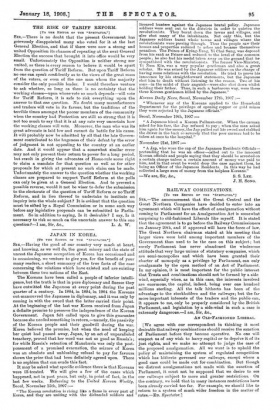JAPAN IN KOREA.
[TO THE ninron OF TUE "SPECrATOR.".1
Sin,—Having the good of our country very much at heart, and knowing, as we well do, the great misery and the state of unrest the Japanese occupation of Korea has occasioned and is occasioning, we venture to give you, for the benefit of your many readers, a short summary of the true facts of the case concerning the relations which have existed and are existing between these two nations of the East.
The Koreans have been called a people of inferior intelli- gence, but the truth is that in pure diplomacy and finesse they have outwitted the Japanese at every point during the past quarter of a century. In 1884, in 1894, in 1904 the Koreans out-manceuvred the Japanese in diplomacy, and it was only by coming in with the sword that the latter carried their point. At the beginning of the last war Korea received from Japan a definite promise to preserve the independence of the Korean Government'. Japan felt called upon to give this guarantee because she needed something in return,—namely, the passivity of the Korean people and their goodwill during the war. Korea believed the promise, but when the need of keeping her quiet had passed away, Japan, by an act of unparalleled treachery, proved that her word was not so good as Russia's; for while Russia's retention of Manchuria was only the post- .ponement of a promised evacuation, the seizure of Korea was an absolute and unblushing refusal to pay for favours shown the price that had been definitely agreed upon. There is no sophism that can evade this fact.
It may be asked what specific evidence there is that Koreans were ill-treated. We will give a few of the cases which 'happened, not in past years, but only, in point of fact, in the last few weeks. Referring to the United Korean Weekly, *Seoul, November 15th, 1907:— " The Korean revolution is rising like a flame in every part of Korea, and they are uniting with the disbanded soldiers and licensed hunters against the Japanese brutal policy. Japanese soldiers were sent out to the districts in order to quieten the revolutionists. They burnt down the towns and villages, and 'also shot many of the inhabitants. Not only this, but the Japanese soldiers burnt whole towns and villages where the revolutionists were passing through. Thus the people saw their houses and properties reduced to ashes and became themselves penniless. The Prince of Kying-Yang, Yi Chai Sung, was deposed from his rank as Prince and reduced to the level of the common people ; he also had his medal taken away on the ground that he sympathised with the revolutionists. The former Vice-Minister, Yi Nam Kiu, was a very popular gentleman and also a great scholar. He was seized by the Japanese soldiers on the charge of having some relations with the revolution. He tried to prove his innocence by his straightforward statements, but the Japanese shot him to death without listening to the reason. Two of his sons—in the midst of their anguish—were also shot down whilst holding their father. Thus, in such a barbarous way, were these three Korean gentlemen killed by the Japanese."
Korean Daily News, Seoul, November 17th, 1907 :—
" Whenever any of the Koreans applied to the Household Department for the privilege of opening copper or gold mines they were rejected by the Japanese officials."
Seoul, November 19th, 1907 :—
" A Japanese hired a Korean Pullman-car. When the carman asked for his fare, the Jap refused to pay ; when the man asked him again for the money, the Jap pulled out his sword and stabbed the drivei in the back so severely that the poor carman had to be taken at once to the hospital."
November 21st, 1907 :—
"A Jap, who wore the cap of the Japanese Residents Officials— pretending that he was an officer—called out to the innocent Korean officials and people saying that they should be arrested on a certain charge unless a certain amount of money was paid to him, and in that event he would drop the case against them, he being an Officer of the Japanese Residents. In this way he had collected a large sum of money from the helpless Koreans."
J. H. SONG.






































 Previous page
Previous page